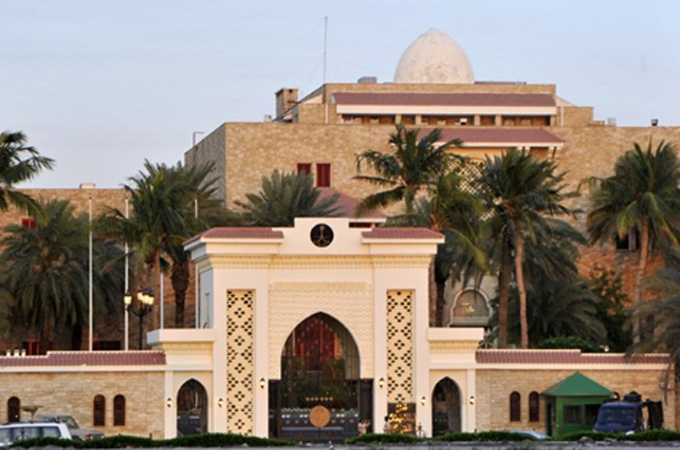Ben Ali gets refuge in Saudi Arabia
Decision to host former Tunisian president sparks angry criticism on the internet.

 |
| The Saudi government welcomed Ben Ali on Friday, ushering him to a heavily guarded palace in Jeddah [AFP] |
Zine El Abidine Ben Ali, Tunisia’s former president, has taken refuge in Saudi Arabia following a mass public uprising and weeks of deadly protests.
Saudi Arabia confirmed on Saturday that he and his family have been welcomed into the kingdom due to “exceptional circumstances” in Tunisia.
“Out of concern for the exceptional circumstances facing the brotherly Tunisian people and in support of the security and stability of their country… the Saudi government has welcomed president Zine El Abidine Ben Ali and his family to the kingdom,” the government said in a statement.
Ben Ali fled to the Red Sea port city of Jeddah on Friday, where he and his family were ushered to a heavily guarded palace tucked behind palm trees and greenery.
By taking him in, the Saudis wanted to “defuse” the tensions on the streets of Tunisia. It was certainly “not out of sympathy” for Ben Ali, Mustafa Alani, research director at Dubai’s Gulf Research Centre, said.
The Saudis had two options — either they “contribute to solving the problem by giving him refuge” or “let him stay in the country … (where) things would go from bad to worse,” he said.
Conservative society
Ben Ali, renowned for cracking down on Islamists, had to finally settle in ultra-conservative Saudi Arabia as he was refused asylum by one of his closest allies, France.
“It might be ironic for a person who fought the hijab (Muslim women’s head cover) to end up being given asylum in an Islamic state,” Riad Kahwaji, head of the Dubai-based Institute for Near East and Gulf Military Analysis, said.
“His wife will have to live veiled, under the law there.”
In a post on Saudi news website sabq.org, one reader wrote: “Only now does the dictator who fought religion and the religious get to know the land of the two holy shrines (Mecca and Medina) … You and your wife are not welcome.”
“We hope the kingdom will help us bring this man [Ben Ali] to justice, if needed,” said another post under the name of “citizen” on the Dubai-based and Saudi-owned alarabiya.net news website.
However, Ben Ali had to accept “a long list of conditions” before the secular leader was given asylum in Saudi Arabia, including being “shut out of the media and out of politics,” according to Alani.
Political haven
Several other leaders who found refuge in Saudi Arabia were taken under the same conditions, said Abdul Aziz al-Sager, chairman of the Gulf Research Centre.
Until his death in 2003, Uganda’s ex-president Idi Amin spent more than two decades in exile in the oil-rich kingdom, kept away from politics and the media.
Saudi Arabia, whose law allows for political asylum in public interest cases, also granted asylum to ex-Pakistani premier Nawaz Sharif, who was ousted by Pervez Musharraf and sent into exile in 2000 before returning in 2007.
“Sharif was not allowed to carry out any political activity in Saudi Arabia. When he decided to return to politics, he left Saudi Arabia,” al-Sager said.
Speaking to Al Jazeera on Sunday, Abdulaziz Alkhamis, a Saudi journalist, told Al Jazeera that he was not surprised that Ben Ali was granted refuge in the kingdom.
“Ben Ali is not the first one,” he said, pointing out that Habib Bourguiba, the man Ben Ali deposed as Tunisia’s president in 1987, and Abdelaziz Bouteflika, Algeria’s current president, had also sought refuge in Saudi Arabia in the past.
Alkhamis said “many of the other fugitives … [have] been in Saudi Arabia before, with welcome from the Saudi government. It’s important to note that in Arab tradition, you can’t turn down any displaced Arab coming to you.”
But Alkhamis said it would be naïve to ignore that actual reason behind Saudi’s hospitality – “the strong relationship between Ben Ali and the royal family of Saudi Arabia”, as well as the security relationship between Tunisia and Saudi Arabia.
He said the general view of Saudi society of the government’s practice of giving safe haven to political fugitives is one of disapproval, especially in the case of Ben Ali, “because of his reputation in the Arab world as one of the dictators coming again to Saudi Arabia after Idi Amin, the Ugandan president”.
Indeed, the kingdom’s decision to house the embattled leader, in power for more than 23 years, has sparked angry condemnation among many in Saudi Arabia and elsewhere: